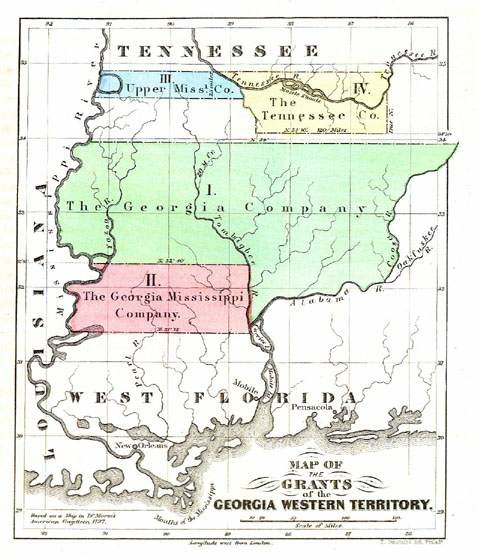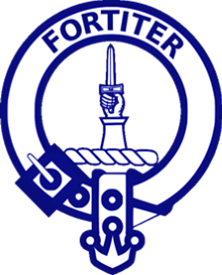Matthew McAllister and
The Yazoo Land Fraud
Frank McAlister and I recently visited Bill Vincent in Lutherville, MD to discuss constructing a data base for easy retrieval of some basic records being abstracted on Scottish McAllister families. Bill gave me a copy of a message from Beth Colvin, one of his many correspondents. The message answered one of Bill's queries to determine if Pickett's History of Alabama: and incidentally of Georgia and Mississippi, by Albert James Pickett, Charleston: Walker and James, 1851, contained any McAllister references. Beth's reply quoted the following from page 446:
"For the sum of two hundred and fifty thousand dollars the (Georgia) legislature sold to James Gunn, Matthew McAllister, George Walker and their associates, termed the Georgia Company an immense territory, which now embraces the following modern counties:
In Alabama: Clarke, Marengo, Greene, Perry, Autauga, Bibb, Shelby, Tuscaloosa, Pickens, Fayette, Jefferson, St. Clair, and southern portions of Wilcox, Monroe, Dallas, Sumter and Baldwin.
In Mississippi: The larger portions of Kemper, Neshoba, Leake, Madison, Yazoo and Issaquena, and all of Washington, Holmes, Attala, Winston, Noxubee, Lowndes, Oktibbeha, Choctaw, Carroll, Sunflower, Bolivar, Tallahatchie, Yalobusha, Chickasaw and Monroe."
In order to get some background on Matthew McAllister's role in this incident, I referred to The Almanac of American History by Arthur M. Schlesinger, Jr., G.P. Putnam's Sons, New York, 1983, and found the following entry for 7 January 1795:
"The corrupt Georgia Legislature sells 35 million acres in the Yazoo River territory (including most of Alabama and Mississippi) to four land speculation companies for a nominal sum. The following year, a newly-elected Georgia legislature will invalidate the Yazoo land sale. The confusion over land claims will lead to a congressional investigation and an 1810 Supreme Court decision ruling that the state of Georgia could not revoke its original act."
The June 1995 issue of our Mac-Alasdair Clan journal includes an article by Thomas Gamble (formerly Savannah's mayor), written for the Savannah Morning News issue of October 5, 1930. On pages 22 and 23, he writes about Matthew McAllister's (A04-2-5) involvement in the Yazoo Land Fraud of 1795. A reading of Gamble's article leaves one with the impression that this was an unfortunate action on Matthew's part, since it did not ring true to his character otherwise. Such men as James Wilson of Pennsylvania, signer of the Declaration of Independence and at the time a Justice of the US Supreme Court, General Wade Hampton of South Carolina, and Senator James Gunn of Georgia were also members of the companies which bought the Yazoo land. At the time, Matthew McAllister was the first U.S. District Attorney for Georgia, having been appointed in 1789.
In the early years of the United States, particularly before 1800, there was a great deal of speculation in land, especially in the lands to the west of the original thirteen colonies. From a financial point of view, large loans were owed by the states to their bond holders and other creditors, a massive national debt was owed to the countries which had helped us, and much of the state and federal currencies were worth very little. The nation was beginning to put into effect the hard money fiscal policies of the first Secretary of the Treasury, Alexander Hamilton.
However, there was a commodity which the United States had in great abundance. The land of the nation itself was a treasure of great value. It had not been farmed by the Indians, it was watered by streams and rivers which were full of fish, and game was abundant. Across the Appalachian Mountains, extending west to the Mississippi and south of the Ohio, was a vast expanse of land which was well known to only a few. The states whose western borders joined the Appalachians, such as Virginia, North and South Carolina, and Georgia, laid claim to the land extending westward to the Mississippi. After the Revolutionary War, the states sought to turn their vast holdings into cash, which was desperately needed.
The origin of the Yazoo Land Fraud really got started in 1785 with the organization of the Combined Society and the creation of Bourbon County, Georgia. The Combined Society was a secret society whose only purpose was "By means of certain influences brought to bear upon those in authority to obtain from the state (Georgia) large grants of land, either for immigration or sale, in either case for the end of making a large sum of money out of the transaction." Bourbon County, Georgia was located on the Mississippi and included the site of the future city of Natchez. Georgia appointed civil and judicial officers for Bourbon County but repealed the Bourbon County Act in 1788. The Combined Society faded away, but the opportunity remained in the minds of many speculators.
In 1789, three companies, the South Carolina Yazoo Company, the Virginia Yazoo Company (headed by Patrick Henry), and the Tennessee Company were formed to buy land from the Georgia Assembly. On December 21, 1789, Governor Edward Telfair signed into law a bill selling 20 million acres of land to the Yazoo Companies for $207,000. The deal fell through when the companies tried to pay in old and, in some cases, worthless currency.
In 1794, four new Yazoo companies, (see map) the Georgia Company, the Georgia-Mississippi Company, the Upper Mississippi Company, and the Tennessee Company, bribed and intimidated a bill through the Assembly that sold them more than twice the amount of land for $500,000. It passed the Georgia House 19 to 9 on January 2, 1795, and the Senate 10 to 8 the following day, and was signed into law by Governor George Matthews on January 7, 1795. A bid of $800,000, with a deposit of $40,000 in hard money by the Georgia Union Company was ignored. Senator James Gunn was a major stockholder in the companies, as were a number of other Georgia legislators.
 At the time of this action in the Georgia legislature, the state capital was at Louisville in Jefferson County. The public reaction was severe because of the large amount of land sold for such a small sum of money, and the overwhelming feeling that a number of insiders were about to reap immense profits. Later in 1795 the electorate expressed its dissatisfaction by voting most of the bill's supporters out of office. Senator James Jackson led the opposition which rescinded the act on February 18, 1796. In his speeches, Jackson vowed to repeal the Yazoo grant law even if it cost him his life. He was prepared to call out and shoot every person involved in passing the 1795 law. All the records of the bill and resulting sales were collected in front of the Capitol building on February 21, 1796, and "consumed by Holy Fire from Heaven" summoned with the aid of a magnifying glass. The state refunded the money already paid for the land, but some of it had already been resold to people who refused the money, preferring the land instead. These claims were not recognized by the state, and the matter ended up in court.
At the time of this action in the Georgia legislature, the state capital was at Louisville in Jefferson County. The public reaction was severe because of the large amount of land sold for such a small sum of money, and the overwhelming feeling that a number of insiders were about to reap immense profits. Later in 1795 the electorate expressed its dissatisfaction by voting most of the bill's supporters out of office. Senator James Jackson led the opposition which rescinded the act on February 18, 1796. In his speeches, Jackson vowed to repeal the Yazoo grant law even if it cost him his life. He was prepared to call out and shoot every person involved in passing the 1795 law. All the records of the bill and resulting sales were collected in front of the Capitol building on February 21, 1796, and "consumed by Holy Fire from Heaven" summoned with the aid of a magnifying glass. The state refunded the money already paid for the land, but some of it had already been resold to people who refused the money, preferring the land instead. These claims were not recognized by the state, and the matter ended up in court.
On April 26, 1802, Georgia ceded the disputed Yazoo land, along with associated problems, to the United States for $1,250,000 and the removal of the Cherokee Indians from Georgia at Federal expense. Finally, in 1810, the U.S. Supreme Court handed down its decision in the case of Fletcher vs. Peck. Chief Justice Marshall and his associates established the inviolability of a state's contracts by overturning as unconstitutional the 1796 act of the Georgia legislature which had rescinded the Yazoo Land Act of 1795.
This decision of the Supreme Court ended the involvement of Matthew McAllister in the movement to expand Georgia to the west. The states of Mississippi and Alabama were admitted to the Union in 1817 and 1819, respectively. Matthew later served as the mayor of Savannah in 1812.
His son, Matthew Hall McAllister (A04-2-5-3), enjoyed a distinguished career in Georgia politics, and later moved to San Francisco, California in 1850, where he served as a U.S. Circuit Court judge. McAllister Street in San Francisco was named for him.

